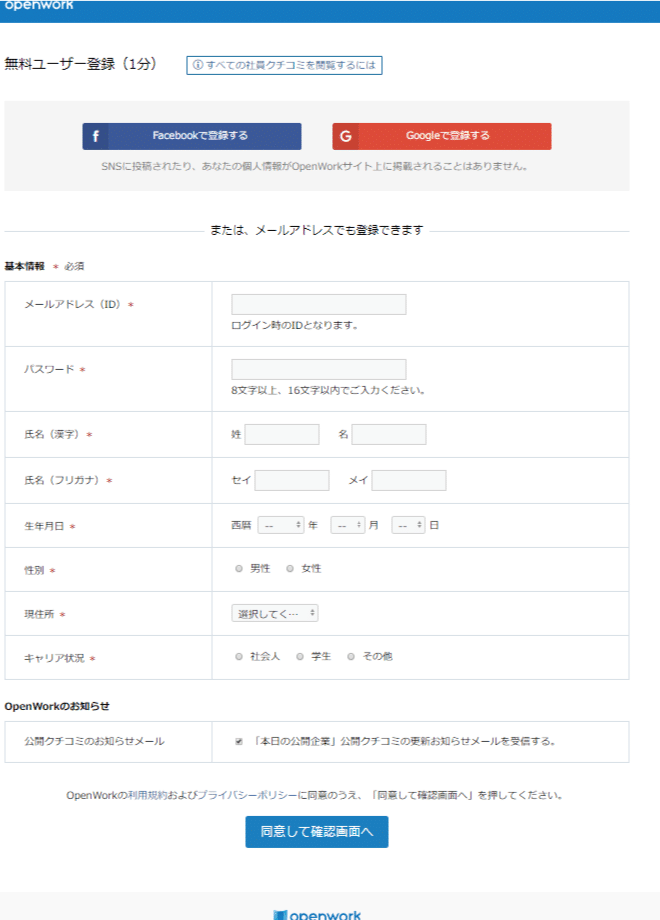Procedures to Identify Reviews of Openwork and the Average Cost of Legal Fees

When choosing a job or considering a career change, the presence of review sites is increasing as they provide real information about human relationships and corporate culture.
However, reviews about companies are often made by former employees, which tends to result in a high number of negative posts. Furthermore, on sites that do not verify the identity of the registrant, it is possible that individuals who are not even part of the company may post negative comments to spread bad reputation about the company.
If a defamatory review is posted on Openwork (Japanese job review site), it is effective to take steps to identify the poster. In this article, we will introduce the specific methods to identify the poster on Openwork and the average cost of attorney fees.
What is openwork?
Openwork started on May 23, 2019, as a rebranding of Vorkers, which began its service in 2007. (The operating company’s name was also changed from Vorkers to Openwork Corporation.)
The reason behind the name change is a strong desire to further grow the site as a platform. The origin of the name comes from the idea of providing a more transparent (open) job selection (work). It embodies the hope that each user will obtain real information about companies and find a company they are satisfied with.
With approximately 9.4 million reviews and about 2.9 million registered users, it is the largest job review site.
Since you can register an account with openwork for free, you can post reviews about each company regardless of whether you have worked there or not. Therefore, it is possible that posts intended to defame from malicious outsiders may occur.
However, there is a requirement that reviews must be at least 500 personalitys, so it is thought that posts intended to harass will not occur easily.
Examples of Defamation that Could Occur on openwork
Openwork is a site primarily used for company research in job hunting and career change activities. If negative reviews are spread, potential applicants may be deterred, resulting in the loss of excellent talent and significant damage to the company.
Here are some specific examples of defamation that could occur on openwork.
Defamatory Content from Employees (Former Employees)
There are not a few reviews from employees (former employees) aimed at tarnishing the reputation of the company.
- There are no clear criteria for evaluation, and ratings are given based on the president’s preference
- Although they claim to have a paid leave acquisition rate of 50% on the surface, in reality, very few employees are able to take it
- Power harassment is rampant in sales, and dozens of people have left the company in a short period of time due to it
The above content is undoubtedly intended to tarnish the social reputation of the company, and if such reviews are posted without basis in fact, there is a high possibility that they could be considered defamation. If you want to know more about the requirements for defamation, please refer to this article.
https://monolith.law/reputation/defamation[ja]
Content that Constitutes Leakage of Confidential Information
Given the nature of company reviews, there is a risk that content that should not be leaked to the outside, such as unique know-how in product development and financial and management figures, may be posted. If a leak of confidential information occurs, it can cause fatal damage to the company, so it is a matter that must be dealt with immediately upon discovery.
If you find a defamatory review about your company on openwork, you can take the following two measures:
- Request for deletion of the review
- Identification of the reviewer
If the deletion is successful, further damage can be prevented, but the reviewer cannot be held accountable. If actual damage, such as a decrease in sales due to a decline in brand image, has occurred, you may want to claim damages. In this case, you will need to go through the process of identifying the poster.
In the next chapter, we will explain in detail the procedure for identifying the poster.
Procedure for Identifying the Poster 1: Request for Disclosure of IP Address
What is an IP Address?
The first step in identifying the poster is to request OpenWork Corporation, which operates the site, to disclose the IP address of the relevant review. An IP address is a number assigned to a terminal connected to the Internet. In other words, if the IP address is identified, the terminal that posted the defamatory content can be identified.
Openwork allows anonymous posting, but the following information is required when posting:
- Job type
- Position
- Duration of employment
- Whether you are a new graduate or a mid-career hire
- Gender
Because quite detailed information is required, considering the timing of the post, it is conceivable that if someone inside the company sees it, they can identify who made the post.
Also, free registration on the site is required to post, and the information required at the time of registration is as follows:
- Email address
- Password
- Name (in kanji)
- Name (in katakana)
- Date of birth
- Gender
- Current address
- Career status

Since important personal information such as name and address is required at the time of registration, it is also possible to directly request the site to disclose the address and name. However, in this case, since the address and name are important personal information, it is necessary to file a lawsuit.
Request for Disclosure of the Poster’s IP Address by Provisional Disposition Procedure
When requesting the disclosure of an IP address, a court procedure is basically used. Instead of filing a lawsuit, a simple court procedure called a provisional disposition is taken. A provisional disposition is a procedure to realize the state where the claim is recognized before the trial.
Since provisional dispositions are quicker than trials, they are suitable for online defamation where quick response is required. Although it is only a “provisional” disposition, it is an order from the court, so there is a high possibility that the site will respond to the request.
However, since it is a procedure through the court, legal argument is required, so it is recommended to ask a lawyer instead of dealing with it alone. The average cost of a lawyer in this case is said to be:
A retainer fee of about 300,000 yen and a success fee of about 300,000 yen
https://monolith.law/reputation/reputation-lawyers-fee[ja]
The above cost is the amount when requesting the removal of the review at the same time. However, the amount will naturally vary depending on the number and volume of reviews. Openwork has a minimum standard of 500 personalitys, which is quite a lot for a review site, so the cost is expected to be high.
Need to Claim and Prove that the Post is Illegal
In order to get a court to issue an order to disclose the IP address, you need to claim and prove that the post is illegal. It should be noted that if it is not illegal, the court will not recognize the claim.
On the other hand, in a request to remove a review, if you can prove that it violates the site’s terms of use in addition to being illegal, you can have it removed.
For example, Article 11, Paragraph 1, Item b of Openwork’s Terms of Use, which stipulates prohibited acts for users, states:
The act of disseminating information for the purpose of benefiting or harming a specific company or organization, including our company
https://www.vorkers.com/rule.php[ja]
When compared with this provision, the leakage of confidential information introduced earlier as an example can be said to be an act that harms a specific company, and there is a high possibility that it will be subject to removal.
On the other hand, in a request to disclose an IP address, it is not enough to violate the site, you must prove that it is illegal.
To prove illegality, you need to present reasons why the review is illegal and evidence to support that argument. Since these claims are highly specialized, it is recommended to ask a lawyer who specializes in reputation damage measures.
Procedure for Identifying the Poster 2: Prohibition of Log Deletion
If you can obtain the IP address, you can identify the provider who provided the internet environment to the poster. The provider refers to telecommunications companies such as Nifty for fixed lines and au for mobile lines.
Then, the provider holds logs such as the address and name of the subscriber who used the IP address on the date of the post. In other words, if you can trace the logs, you can obtain the personal information of the poster.
However, providers do not keep logs forever. Especially in the case of mobile lines, some companies delete them after about three months.
Therefore, it is necessary to initiate a legal procedure to prohibit the deletion of logs. However, in many cases, it is sufficient to issue a notice saying, “We are about to request the disclosure of the sender’s address and name, so please keep the log.” At the time of this notification, it is necessary to claim and prove that the relevant review is illegal. The average cost of attorney fees for notification is estimated to be around 100,000 yen.
Openwork also has an app, so it can be used on a smartphone. However, considering the minimum personality count of 500 personalitys for posts, it is assumed that many people will take their time to write on their home PC when they have time.
If you are using your home internet connection, there is a high possibility that you can reach the person immediately if you can check the log.
Procedure 3 for Identifying the Poster: Request for Disclosure of Name and Address
Once the log preservation process is completed, a lawsuit requesting the disclosure of the poster’s name and address is filed against the provider. A request for disclosure of name and address is not a provisional disposition, but requires a lawsuit. This is because personal information such as addresses and names is important information worth protecting, and therefore needs to be discussed more carefully.
In cases of defamation, many cases claim defamation of personality. However, if the post is true, the poster’s privacy takes precedence, and the likelihood of escaping defamation is high. For example, in the previous case, if the court acknowledges that the content stating “I have hardly been able to take paid leave” is true, it becomes quite difficult to accept the claim that it is illegal.
The market price for attorney fees for a request to disclose name and address, according to information on the internet, is:
An initial fee of about 300,000 yen, and a success fee of about 200,000 yen
https://monolith.law/reputation/reputation-lawyers-fee[ja]
as stated.
Step 4 in Identifying the Poster: Damage Claims

If you win a lawsuit requesting information disclosure, the address and name of the provider’s subscriber will be disclosed. Once the poster has been identified, it becomes possible to claim damages from the other party. Not only can you claim compensation for the damages incurred, but you can also claim costs for the lawyer, such as investigation costs and success fees. If all goes well, you can complete the procedure without any substantial burden.
However, there are risks such as whether you can win a compensation amount that fully recovers the lawyer’s fees, or whether a claim for damages will be recognized in the first place. We explain these in detail in the article below.
https://monolith.law/reputation/disclosure-of-ipaddress[ja]
Summary
We have explained the methods to identify the poster when defamatory reviews are posted on openwork. To identify the poster on openwork, it is necessary to initiate several legal procedures such as requesting the disclosure of the IP address, (notification of prohibition of log deletion), a lawsuit requesting the disclosure of address and name, and a claim for damages.
Since all procedures through the court require legal claims and proof, it would be advisable to consult with a lawyer who is strong in reputational damage measures.
Category: Internet





















